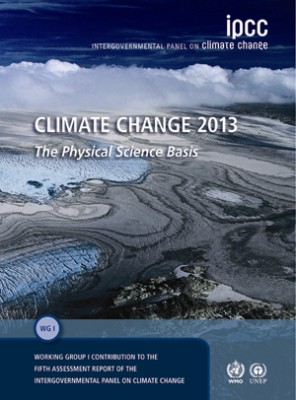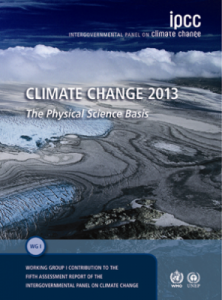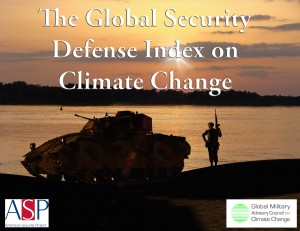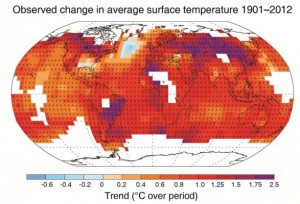
IPCC Report Shows Climate Change Risk is Real and Urgent
 Today, the Intergovernmental Panel on Climate Change (IPCC) released the Summary for Policymakers of the first section of its 5th Assessment Report in Stockholm, Sweden. The report details the physical science basis for climate change.
Today, the Intergovernmental Panel on Climate Change (IPCC) released the Summary for Policymakers of the first section of its 5th Assessment Report in Stockholm, Sweden. The report details the physical science basis for climate change.
Essentially, this report seeks to answer three questions: (1) is climate change happening, (2) are humans responsible for it, and (3) what will the climate look like over the next century?
The answers to these questions are clear:
1. “Warming in the climate system is unequivocal, and since the 1950s, many of the observed changes are unprecedented over decades to millennia.”
2. “It is extremely likely that human influence has been the dominant cause of the observed warming since the mid-20th century.”Note: “extremely likely” is their term for a 95% confidence level. This is the scientific equivalent of no serious dissent.
3. “Continued emissions of greenhouse gases will cause further warming and changes in all components of the climate system. Limiting climate change will require substantial and sustained reductions of greenhouse gas emissions.”
Today’s report is only the first release of the three working groups. Working Group II will assess the impacts of climate change and our vulnerability to it; it will be released in Yokohama, Japan on March 25, 2014. Working Group III will assess how to mitigate (prevent and reduce) climate change; it will be released on April 7, 2014 in Berlin, Germany.
The final Synthesis Report, pulling together all sections, will be released next October in Copenhagen, Denmark.
The impacts that climate change will have on national security are clear.
The American Security Project has studied this issue since our founding. While today’s release does not asses the impacts of climate change on global security, we know from our research that there will be serious implications of climate change on security. For the first time, Working Group II will include a chapter with an assessment of the security implications of a changing climate, and we look forward to seeing their results next spring.
Today’s release underscores the reality of climate change: it is happening, and it is caused by humans. Those of us in the security community say that climate change threatens security because it is a “threat multiplier” or an “accelerant of instability” that affects issues like food, water, energy security. It is already driving internal and cross-border migration and causing food and water security challenges.
 The truth is that our society is failing at basic risk management. A 95% certainty that climate change is happening and is caused by humans is a clear argument for prudent action to mitigate emissions and reduce risk. Instead, we remain paralyzed both domestically and internationally.
The truth is that our society is failing at basic risk management. A 95% certainty that climate change is happening and is caused by humans is a clear argument for prudent action to mitigate emissions and reduce risk. Instead, we remain paralyzed both domestically and internationally.
National security planning is about managing risk. The IPCC release again shows the risks of climate change are real and growing every day. We cannot afford to ignore this risk.
Fortunately, risk management is something that militaries do well.
ASP has undertaken a new survey to look at all 196 countries in the world to see how their security communities are planning for climate change. The Global Security Defense Index results are that the governments and militaries of an overwhelming majority of countries – at least 70% – have identified climate change as a threat to their security. Many have fully integrated it into their defense and national security planning documents. The importance that military and defense planners place on climate change shows that the world is demanding action to address this issue.
Those who disagree with the clear global military consensus on climate change are ignoring risk and putting the world’s security in danger.
Even if policymakers choose not to believe that human activity contributes to climate change, or even that the climate is changing, the military knows that prudent planning means that you cannot wait until you have 100% certainty. Waiting for certainty on the battlefield can be disastrous.
The IPCC report argues for prudent, no regrets action to reduce emissions and build greater resiliency now in order to reduce future risk. We hope that the IPCC’s invaluable contribution to the scientific knowledge about the physical science of climate change will lead to a smarter debate about necessary action, both here in the U.S. and around the world.







[…] IPCC Report Shows Climate Change Risk is Real and Urgent Andrew Holland […]